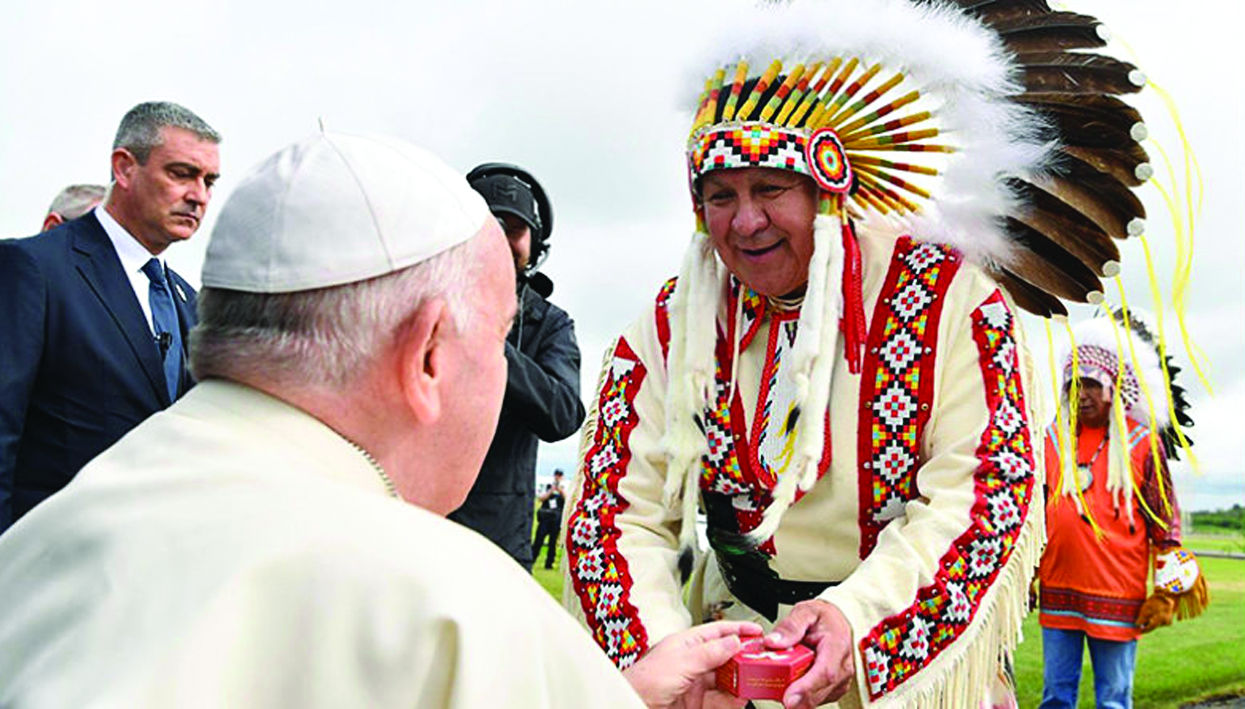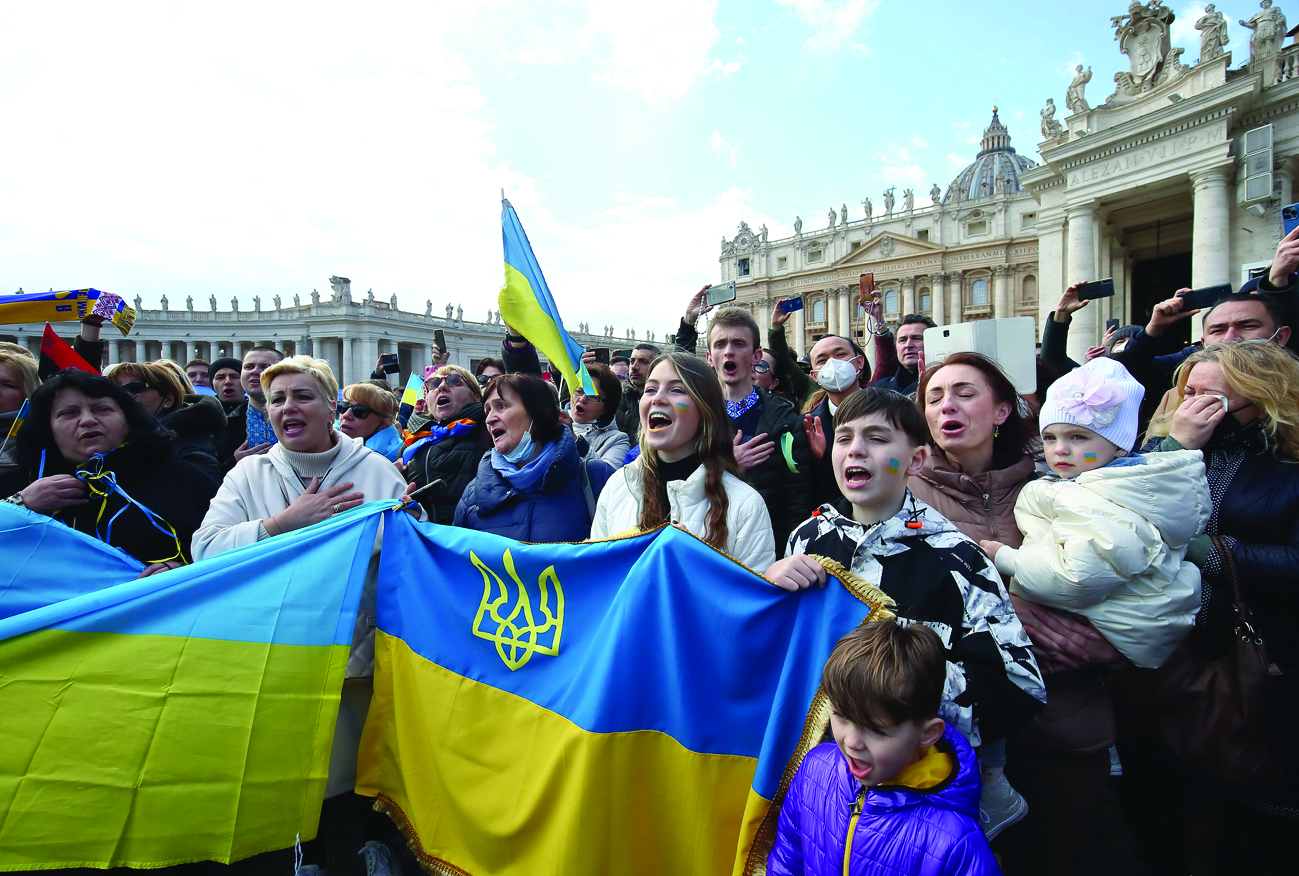The possibility of an official meeting between Benedict XVI and Russian Orthodox Patriarch Kirill of Moscow and All Russia is an idea which crops up in the international media from time to time. For example, in Zenit’s report on September 19, Russian Orthodox Hieromonk Giovanni Guaita said such a meeting is “an eventuality that was never excluded in the past and which seems closer today.”
The two men have already met, but it was before Kirill became Patriarch in 2009. Kirill met Benedict XVI three times at the Vatican between 2005 and 2007. Kirill was then head of the Department for External Relations of the Moscow Patriarchate.
The idea of a possible face-to-face meeting between the heads of the two Churches was discussed during their first meeting in 2005, when Metropolitan Kirill was received by a newly-elected Pope Benedict XVI.
Hieromonk Guaita (hieromonk is a title attributed by the Eastern Churches to monks who have received priestly ordination) said such a meeting could only occur, however, on the condition that some open questions are resolved. “Some knots must be untied, not so much in Russia as in other countries, for example, Ukraine,” the monk said — an obvious reference to the relations of the Orthodox Church with the “Uniate” (Byzantine-rite Catholic) Church.
Italian journalist Andrea Gagliarducci, writing in Korazym.org on August 14, said a visit by Patriarch Kirill to Poland might facilitate such a Pope-Patriarch meeting.
Gagliarducci then added something interesting. He said a Pope-Patriarch meeting “should take place in a neutral territory (neither Rome nor Russia) and for this Finland has recently offered herself as a candidate.” (Gagliarducci was writing the day after an item appeared in Catholic World News with the headline: “Could Pope, Russian Patriarch Meet in Finland?”)
Finland? Yes — more and more it looks as if Finland could emerge as the possible site for this meeting, which will be historic for the two Churches, as no Patriarch of Russia has ever met with the Pope of Rome.
For this possibility to actually materialize, however, there are other knots which need to be untied.
But let’s begin from where it all started, on June 12, when a report headlined “Patriarch Kirill Meets With Heads of Christian Churches in Finland” appeared on the official website of the Moscow Patriarchate. The meeting took place in Moscow.
The report said Kirill had met “with Archbishop Leo of Karelia and All Finland (Finnish Autonomous Orthodox Church), Archbishop Kari Mäkinen of Turku, primate of the Evangelical Lutheran Church in Finland (ELCF) and Bishop Teemu Sippo of Helsinki (Roman Catholic Church).”
At the beginning of the meeting, the report said, “Archbishop Leo greeted Patriarch Kirill on behalf of the heads of the three traditional Christian Churches in Finland and conveyed to him a written invitation to come to Finland for an official visit.”
Patriarch Kirill, for his part, noted that the relations between the Russian Orthodox Church and the Christian communities in Finland have been a model of friendship and good-neighborly cooperation for several decades.

Historic Moscow meeting: the Finnish delegation sitting to the right of Patriarch Kirill; the Orthodox Archbishop Leo, next to the Patriarch; the Lutheran Archbishop Mäkinen (second) and the Catholic Bishop Sippo (third) (Photo courtesy of FIDES, Finland’s Catholic diocesan magazine)
During the meeting, the report pointed out, the need for “active cooperation” to strengthen the religious factor in public and international life was highlighted, including “further development of inter-Church relations in social service, organization of pilgrimages, and pastoral care of Russian visitors to Finland.”
In a subsequent item, which appeared in Finland’s national public-broadcasting company Yle-Uutiset newscast on July 16, a Vatican official was quoted as having suggested that Pope Benedict XVI and Russian Orthodox Patriarch Kirill meet in Finland. And Bishop Sippo was also quoted as having forwarded the invitation to Orthodox officials during the above visit to Moscow.
In recent conversations with Inside the Vatican and subsequent contacts with the Catholic curia in Helsinki and the Orthodox headquarters in Kuopio in central Finland, both senior prelates, the Catholic Bishop Sippo and the Orthodox Archbishop Leo, confirmed that the above reports about a possible Pope-Kirill meeting are accurate.
Since a visit of the Pope to Russia may be highly unlikely for political reasons, Bishop Sippo said, the possibility for such a meeting to take place is considered “less unlikely” in what is commonly regarded as an ideal, neutral ground: Finland. “Patriarch Kirill is known to be a very ecumenical person,” Bishop Sippo went on, “and we are still waiting for his reaction to our invitation.”
But much depends also on the attitude of the various Christian communities concerning homosexuality and the practice of “blessing” or praying with persons living in so-called “same-sex unions.”
This was among the issues discussed during the above June 13 meeting in Moscow, Bishop Sippo told Fides (No. 8, August 10, 2012), the official mouthpiece of the Helsinki Catholic diocese in Finland.

Vanha Valamo (or Old Valamo), after the name of the largest island in Lake Ladoga where this Orthodox monastery was originally located. Due to the 1940 Winter War, its 150 monks moved to Heinävesi in Finland, establishing Uusi Valamo, the new Valamo monastery.
“The Orthodox Church strongly adheres to the moral teaching presented in Scripture,” Patriarch Kirill was quoted as saying in the Patriarchate website report cited above. “If during a confession a person repents of a sin, the Church, according to the Savior’s commandment, forgives him or her ‘up to seventy times seven’ (Mt. 18:21-22). The forgiveness, however, does not mean justification; for the Church ought to awaken a person’s conscience, not justify his or her sin. Homosexual relations are sinful, and for this reason the Church cannot bless them.”
According to Kirill, justification of sin by a Christian community means a loss of its own identity and the authority of the Church cannot be used to justify a sin. “The Church is called to witness with prophetic voice to the Truth of God,” Kirill said. “In today’s world, there are forces who wish that the Church should adhere to political correctness, but we should take the path of witness to the Christian truth to the end, as our fathers did in the hard post-revolutionary time, when the Communist power offered them an opportunity to join the so-called ‘Red Church’ in exchange for their survival. Some accepted it, but most of the people did not. Thousands of martyrs and confessors of the faith chose the terrible path of suffering.”
As a result of the discussion, the report concluded, it was agreed that there was a need to clarify the stand taken by Finland’s Evangelical Lutheran Church on this issue within the framework of inter-Church talks. On the result of this clarification will depend the continuation of the bilateral dialogue.
And a possible visit of the Patriarch to Finland must also be seen against the background of this issue.
What is the current situation in Finland in this regard? “Currently it is possible for homosexuals to register their relationships and there have already been attempts to legalize so-called same-sex marriage,” Bishop Sippo said. “There is just now a debate in the Lutheran Church over whether they are going to accept it or not. At present, the Lutheran Church gives freedom to pastors if they wish to pray together with those couples. It’s not a sort of blessing, but a free prayer. But this is already some kind of a concession, a compromise that opens the way for further concessions. And interestingly, the Orthodox Church is already asking what kind of content this prayer has, because they are afraid that the Lutheran Church may end up accepting same-sex marriages and ultimately viewing them as valuable like heterosexual marriage, and the Orthodox Church is not willing to cooperate with a Church that has such an intention.”
He said he is a bit pessimistic about the situation. “I am worried, though there are Lutheran bishops who are very strongly against it, and the primate, Archbishop Mäkinen of Turku, has never said he is in favor. The fact is that, historically, the Lutheran Church of Finland tends to follow in the footsteps of the Lutheran Church of Sweden, and there they have already endorsed same-sex marriage for some years now. I am afraid sooner or later it will also come here to Finland. But the Orthodox Church is very much against it, and we as the Catholic Church will never be able to accept it.”
For his part, Orthodox Archbishop Leo, after having noted that Benedict XVI has never come to Finland, while John Paul II visited the country in 1989, confirmed that the recent visit of the three to Moscow was motivated by their desire to extend to Patriarch Kirill an invitation to come to Finland. “There may be some reasons not to have the meeting in Russia,” he pointed out. “That’s why we invited (them) to meet in Finland.”
But who had the idea first? “I am not sure who had this idea first, but I think it is our common interest,” Archbishop Leo said.
Regarding the meeting the Finnish religious delegation had in Moscow, he said it was challenging for Archbishop Mäkinen, because of the different views that the Orthodox Church in Russia and the Lutheran Church have on some ethical issues.
About his final impression of his talks with the Patriarch and his “foreign minister” Metropolitan Hilarion of Volokolamsk, Archbishop Leo is convinced that eventually “the Patriarch will come to Finland and visit our Church, and why not the Catholic Church in Finland also?” But it will still take a little while before Kirill’s visit could actually take place. “I know Kirill personally and we have good working relations,” Archbishop Leo says. “He will make the visit, but first he must meet with leaders of larger Churches to address more pressing priorities.”
During his recent meeting with Italy’s Prime Minister Mario Monti, as reported again in an item on the Moscow Patriarchate official website (July 22, 2012), Patriarch Kirill also stated that in recent years there was a considerable improvement in relations with the Roman Catholic Church. “In fact, we hold the same views on many issues, first of all, on pastoral matters relating to the life of the modern man,” he was quoted as saying. In Patriarch Kirill’s view, this area of bilateral dialogue is the most important one, since the topics under discussion have a direct bearing on people’s lives: “It does not mean that traditional theological problems we have inherited from the past are of no importance; it means that our attention is directed to pressing problems affecting the life of the modern Christian, both the Orthodox and the Catholic.”
Alberto Carosa is an Italian writer living in Rome. He recently traveled to Finland.






Facebook Comments